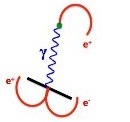The following tiny mystery struck me while I was pondering the group
operation on an elliptic curve. However, the context is not
necessary for understanding the paradox, only a little simple
algebra.
We start with the elliptic curve, which has the equation
y^2 = f(x) = x^3 - a x^2 + b x - c.
Consider any two values of the pair (x,y) that lie on this curve,
say (r,s) and (t,u). Keep them fixed throughout the following
argument. Here r and t can be chosen completely arbitrarily, and
there are then only one or two possible choices for s and one or two
possible choices for t. (I'm assuming we are working with complex
numbers here, so there really will be values of s and u to
choose from.) The main point is that r and t really can have any
two values we want them to have.
These two points also satisfy a linear relation in x and y, namely
y = ((u - s)/(t - r)) x + (t s - r u)/(t - r),
That is, x = r implies y = s and x = t implies y = u in this
relation. This equation can be formed starting from any two points
(r,s) and (t,u) with r different from t.
Now I noticed that if you square y in the second equation, the
resulting expression is homogeneous in u and s of degree 2, that is,
u and s occur in every term in one of the three forms u^2 or s^2 or u s. If you use the
equations s^2 = f(r) and u^2 = f(t) and set x = t, you will get an
equation that can be solved for the product u s in terms of r and t
alone. What its exact form is doesn't matter. The point is, you
have a definite equation
u s = g(r, t).
Mathematica told me that g(r,t) = (r f(t) + t f(r))/(r + t). I got
a slightly more complicated relation, but nevertheless, one that
could be solved for the product u s as a rational function of r and
t.
What disturbed me about this is that this equation appears to follow
logically without any additional assumptions once we assume that u^2
= f(t) and s^2 = f(r). But, without changing t and r, I could also
replace s by its negative. Doing so would change the sign on the
left-hand side of this equation while leaving the right-hand side
unchanged. What's wrong with this?
It took me a long time to see where the difficulty lay, and I thought it might amuse others to think about it.
Paradox in Elementary Algebra? A challenge.
Moderators: kiore, Blip, The_Metatron
•
4 posts
• Page 1 of 1
Paradox in Elementary Algebra? A challenge.
"If it is a Miracle, any sort of evidence will answer, but if it is a Fact, proof is necessary" -- Mark Twain
-

Roger Cooke - THREAD STARTER
- Posts: 1096
- Age: 81

Re: Paradox in Elementary Algebra? A challenge.
Nothing to do with multivaluedness/Riemann surface type things ? Everything's in the complex domain I assume...
A soul in tension that's learning to fly
Condition grounded but determined to try
Can't keep my eyes from the circling skies
Tongue-tied and twisted just an earthbound misfit, I
Condition grounded but determined to try
Can't keep my eyes from the circling skies
Tongue-tied and twisted just an earthbound misfit, I
-

twistor59 - RS Donator
- Posts: 4966


Re: Paradox in Elementary Algebra? A challenge.
s → -s
Like a plane mirror image? Or have I muxed my frames up again?
Like a plane mirror image? Or have I muxed my frames up again?
I am, somehow, less interested in the weight and convolutions of Einstein’s brain than in the near certainty that people of equal talent have lived and died in cotton fields and sweatshops. - Stephen J. Gould
-

newolder - Name: Albert Ross
- Posts: 7876
- Age: 3

- Country: Feudal Estate number 9
Re: Paradox in Elementary Algebra? A challenge.
Uh....never mind. I just sat through a boring two-hour meeting, during which I realized that I had made a mistake in doing the algebra. The equation actually can't be solved for u s. No paradox, unless you divide by zero, which is what apparently I forced Mathematica to do by subterfuge. (You get it to divide by an algebraic expression, then later you set that expression equal to zero. I'm not sure where I did that, but I'll find out.)
Sorry for wasting your time.
Sorry for wasting your time.
"If it is a Miracle, any sort of evidence will answer, but if it is a Fact, proof is necessary" -- Mark Twain
-

Roger Cooke - THREAD STARTER
- Posts: 1096
- Age: 81

4 posts
• Page 1 of 1
Who is online
Users viewing this topic: No registered users and 1 guest